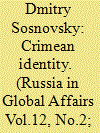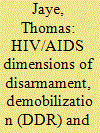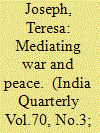|
|
|
Sort Order |
|
|
|
Items / Page
|
|
|
|
|
|
|
| Srl | Item |
| 1 |
ID:
132711


|
|
|
|
|
| Publication |
2014.
|
| Summary/Abstract |
Kiev's attempt to build an all-Ukrainian identity solely on the basis of the Ukrainian ethnos through political centralization, cultural unification, and forceful assimilation was a complete failure. Now, as part of the Russian Federation, which pursues an entirely different regional policy, Crimea has an opportunity to form its own regional identity.
|
|
|
|
|
|
|
|
|
|
|
|
|
|
|
|
| 2 |
ID:
124514


|
|
|
|
|
| Publication |
2013.
|
| Summary/Abstract |
Countries emerging from conflict situations face enormous social, economic, security and political challenges. Contemporary conflicts tend to lead to state and societal collapse, and are characterized by sexual violence and the destruction of fragile economies. Ensuring a safe and secure post-conflict environment for the pursuit of normal life is integral to post-war reconstruction and development processes, and post-conflict environments offer entry points for addressing both the origins and the effects of wars. Accordingly, this article argues that disarmament, demobilization and reintegration (DDR), and security sector reform (SSR), provide important opportunities for incorporating HIV/AIDS issues into broader national security frameworks. Further, the article argues that securitizing HIV/AIDS can ensure that responses to the epidemic are prioritized, but also that the treatment of security personnel should not be privileged over treatment of those who are infected in the larger population.
|
|
|
|
|
|
|
|
|
|
|
|
|
|
|
|
| 3 |
ID:
124195


|
|
|
|
|
| Publication |
2013.
|
| Summary/Abstract |
The most outstanding trend in contemporary conflicts has been the fusion of the threats from terrorism and insurgency. Insurgent threats in many places on the globe today are mistaken as terrorist threats, and counterterrorism (CT) is deployed as the local insurgents come increasingly to resemble their transnational terrorist partners. Such an emphasis on the role of terrorism in insurgencies and the undue focus on CT risks strengthening, rather than severing, the connection between local insurgents and transnational terrorists. Russia's counterterrorist strategy inadvertently transformed the conflict from a contained, nationalist rebellion to a sprawling jihadi insurgency and perversely encouraged the group to resort even more to terrorist tactics. The Russian counterinsurgency has been unsuccessful, as the insurgents are neither demolished as a force nor are they isolated by society. Losing the hearts and minds among the Chechen people is a key reason behind why the Russian operation in Chechnya suffered failures. Too little attention was paid to winning over the "hearts and minds" of the people.
|
|
|
|
|
|
|
|
|
|
|
|
|
|
|
|
| 4 |
ID:
155271


|
|
|
|
|
| Summary/Abstract |
Recent and ongoing wartime experience has discredited much of the thinking that underpinned the “Defense Transformation” effort in the 1990s. If we are to be prepared for future conflict, it is vital that we learn from experience and adjust our thinking about war. It is time to develop idealized visions of future war that are consistent with what post-9/11 conflicts have revealed as the enduring uncertainty and complexity of war. These concepts should be “fighting-centric” rather than “knowledge-centric.” They should also be based on real and emerging threats, informed by recent combat experience, and connected to scenarios that direct military force toward the achievement of policy goals and objectives. We must then design and build balanced forces that are capable of conducting operations consistent with the concepts we develop.
|
|
|
|
|
|
|
|
|
|
|
|
|
|
|
|
| 5 |
ID:
132907


|
|
|
|
|
| Publication |
2014.
|
| Summary/Abstract |
Technological developments over recent years have ensured that the mainstream mass media will play a growing role in social and political processes, and in shaping perceptions and policies relating to domestic as well as international conflicts. Keeping in perspective the potential capability of the news media in situations of conflict and conflict resolution, this article maps the underlying trends in the role of the mainstream international news media in contemporary conflicts, and the issues and challenges that characterise media coverage of such issues. Identifying some of these trends to be-the reflection of the dominant discourse, framing of news along official lines, dehumanising language of war, media management by governments, selective reporting, demonisation of enemies, and so on-the article throws light on the concept of 'peace journalism' as an alternative to conventional news coverage of conflict.
|
|
|
|
|
|
|
|
|
|
|
|
|
|
|
|
| 6 |
ID:
119909


|
|
|
|
|
| Publication |
2012.
|
| Summary/Abstract |
Famed seventeenth-century jurist Hugo Grotius warned that in warfare belligerents must "not believe that either nothing is allowable, or that everything is." The latter belief holds that any and all tactics are allowed in warfare, while the former, a largely Christian theological view, holds that warfare is immoral and any resultant actions are therefore prohibited. Grotius understood that unilateral adherence to either of these notions would lead directly to an unworkable paradigm. Rejecting each belief's most extreme position while simultaneously adopting their reconcilable characteristics, Grotius began to develop a feasible legal framework for conducting warfare. Ultimately, as Oxford University's Karma Nabulsi describes in her outstanding work Traditions of Justice and War, by seeking the "middle ground" between these two seemingly incompatible views Grotius successfully shaped a conciliatory, realistic model for regulating warfare. The resultant middle ground, which recognized the necessity and legality of "just" wars while proscribing certain aspects of military conduct, solidified Grotius's legacy and, more importantly, set the stage for the profound legal developments-particularly in the 20th century-that would circumscribe subsequent conflicts, including those in which the United States finds itself today.
|
|
|
|
|
|
|
|
|
|
|
|
|
|
|
|
|
|
|
|
|